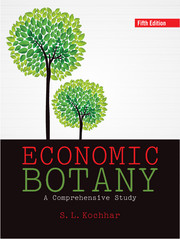Book contents
- Frontmatter
- Dedication
- Contents
- Foreword
- Preface
- Acknowledgements
- 1 Introduction
- 2 Fibres and Fibre Yielding Plants
- 3 Cereal Crops
- 4 Sugars, Starches and Cellulose Products
- 5 Legumes or Pulses
- 6 Vegetable Oils and Fats
- 7 Fruits and Nuts
- 8 Vegetables
- 9 Spices, Condiments and Other Flavourings
- 10 Fumitory and Masticatory Materials
- 11 Beverages
- 12 Wood and its Uses
- 13 Vegetable Tannins and Dyestuffs
- 14 Rubber
- 15 Medicinal Plants
- 16 Insecticides and Herbicides
- 17 Essential Oil Yielding Plants
- 18 Plant Diversity and its Conservation
- 19 Petrocrops: Our Future Fuels
- 20 Ethnobotany: An Integrated Approach
- References
- Index
Preface
Published online by Cambridge University Press: 08 February 2018
- Frontmatter
- Dedication
- Contents
- Foreword
- Preface
- Acknowledgements
- 1 Introduction
- 2 Fibres and Fibre Yielding Plants
- 3 Cereal Crops
- 4 Sugars, Starches and Cellulose Products
- 5 Legumes or Pulses
- 6 Vegetable Oils and Fats
- 7 Fruits and Nuts
- 8 Vegetables
- 9 Spices, Condiments and Other Flavourings
- 10 Fumitory and Masticatory Materials
- 11 Beverages
- 12 Wood and its Uses
- 13 Vegetable Tannins and Dyestuffs
- 14 Rubber
- 15 Medicinal Plants
- 16 Insecticides and Herbicides
- 17 Essential Oil Yielding Plants
- 18 Plant Diversity and its Conservation
- 19 Petrocrops: Our Future Fuels
- 20 Ethnobotany: An Integrated Approach
- References
- Index
Summary
Economic Botany in the Tropics was first published in 1981, and its fourth edition appeared in 2011, and in between the book has been reprinted several times. It is a matter of great privilege and honour that its new edition is being published by Cambridge University Press, under the new title ‘Economic Botany: A Comprehensive Study’ 5th edition. During the course of revision I have been influenced by review inputs from subject experts, across the world, as well as from advice offered to me by the editorial staff of the Cambridge University Press, India. It gives me pleasure in presenting to the readers an expanded and updated edition and I hope it will prove to be even more useful than the previous ones.
Salient features of this edition are as follows:
The production data for different crops is given for the year 2012-13, alongside top ten producers of cereals, grain legumes, fruits, vegetables, oil crops and root and tuber crops. The role of essential fatty acids (EFAs), such as linoleic and linolenic acids in human nutrition has been emphasised. These fatty acids if not supplemented in the diet can lead to many functional disorders.
Another significant feature is the inclusion of well-known ‘natural sources’ of antioxidants and phytonutrients, which, if made a part of our diet, can prevent cardiovascular, cancerous and neurodegenerative disorders, etc. The health benefits of many of our food plants have been given special coverage, along with a listing of the physiological basis of the chemical constituents present in them. Besides these, I have included discussions on ‘the catastrophic sexual transmutation theory’ of the origin of maize; ‘pseudocereals’ such as grain amaranth, quinoa, buckwheat, chia seeds and eel-grass; forage grasses of different regions (in Chapter 3); sugarcane propagation and its breeding strategies, and other sweetening plant materials (in Chapter 4); winged bean and fodder legumes as well as green manures (in Chapter 5); canola oilseed crop (in Chapter 6); kinnow mandarin, Brazil nut and many other sources of exotic fruits (in Chapter 7); True Potato Seed (TPS) Technology and select varieties of potato, turnip and pea (in Chapter 8); the risks associated with the use of Smokeless Tobacco, bidi and E-cigarettes (in Chapter 10); wines, beers, distilled spirits and liqueurs (in Chapter 11); and medicinal yams and Madagascar periwinkle (in chapter 15).
- Type
- Chapter
- Information
- Economic BotanyA Comprehensive Study, pp. xvii - xviiiPublisher: Cambridge University PressPrint publication year: 2016



